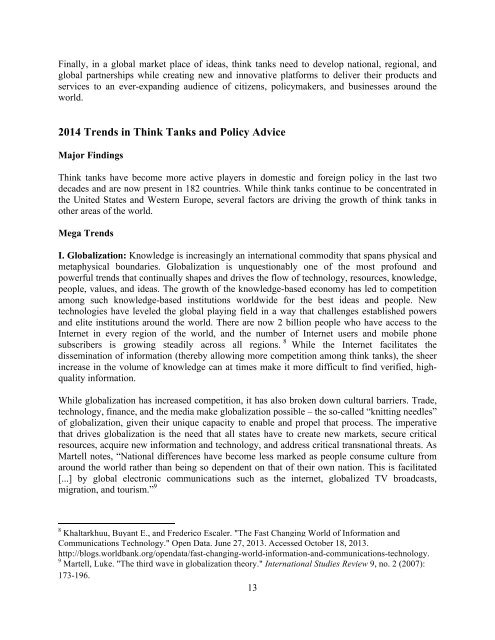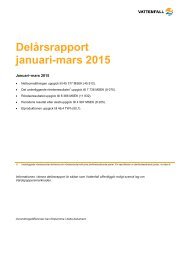2014-global-go-to-think-tank-index-22012015_1
2014-global-go-to-think-tank-index-22012015_1
2014-global-go-to-think-tank-index-22012015_1
- No tags were found...
You also want an ePaper? Increase the reach of your titles
YUMPU automatically turns print PDFs into web optimized ePapers that Google loves.
Finally, in a <strong>global</strong> market place of ideas, <strong>think</strong> <strong>tank</strong>s need <strong>to</strong> develop national, regional, and<br />
<strong>global</strong> partnerships while creating new and innovative platforms <strong>to</strong> deliver their products and<br />
services <strong>to</strong> an ever-expanding audience of citizens, policymakers, and businesses around the<br />
world.<br />
<strong>2014</strong> Trends in Think Tanks and Policy Advice<br />
Major Findings<br />
Think <strong>tank</strong>s have become more active players in domestic and foreign policy in the last two<br />
decades and are now present in 182 countries. While <strong>think</strong> <strong>tank</strong>s continue <strong>to</strong> be concentrated in<br />
the United States and Western Europe, several fac<strong>to</strong>rs are driving the growth of <strong>think</strong> <strong>tank</strong>s in<br />
other areas of the world.<br />
Mega Trends<br />
I. Globalization: Knowledge is increasingly an international commodity that spans physical and<br />
metaphysical boundaries. Globalization is unquestionably one of the most profound and<br />
powerful trends that continually shapes and drives the flow of technology, resources, knowledge,<br />
people, values, and ideas. The growth of the knowledge-based economy has led <strong>to</strong> competition<br />
among such knowledge-based institutions worldwide for the best ideas and people. New<br />
technologies have leveled the <strong>global</strong> playing field in a way that challenges established powers<br />
and elite institutions around the world. There are now 2 billion people who have access <strong>to</strong> the<br />
Internet in every region of the world, and the number of Internet users and mobile phone<br />
subscribers is growing steadily across all regions. 8 While the Internet facilitates the<br />
dissemination of information (thereby allowing more competition among <strong>think</strong> <strong>tank</strong>s), the sheer<br />
increase in the volume of knowledge can at times make it more difficult <strong>to</strong> find verified, highquality<br />
information.<br />
While <strong>global</strong>ization has increased competition, it has also broken down cultural barriers. Trade,<br />
technology, finance, and the media make <strong>global</strong>ization possible – the so-called “knitting needles”<br />
of <strong>global</strong>ization, given their unique capacity <strong>to</strong> enable and propel that process. The imperative<br />
that drives <strong>global</strong>ization is the need that all states have <strong>to</strong> create new markets, secure critical<br />
resources, acquire new information and technology, and address critical transnational threats. As<br />
Martell notes, “National differences have become less marked as people consume culture from<br />
around the world rather than being so dependent on that of their own nation. This is facilitated<br />
[...] by <strong>global</strong> electronic communications such as the internet, <strong>global</strong>ized TV broadcasts,<br />
migration, and <strong>to</strong>urism.” 9<br />
8 Khaltarkhuu, Buyant E., and Frederico Escaler. "The Fast Changing World of Information and<br />
Communications Technology." Open Data. June 27, 2013. Accessed Oc<strong>to</strong>ber 18, 2013.<br />
http://blogs.worldbank.org/opendata/fast-changing-world-information-and-communications-technology.<br />
9 Martell, Luke. "The third wave in <strong>global</strong>ization theory." International Studies Review 9, no. 2 (2007):<br />
173-196.<br />
13




